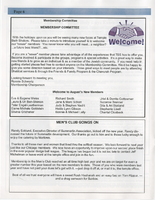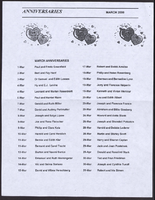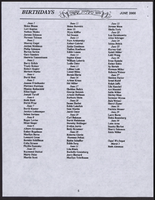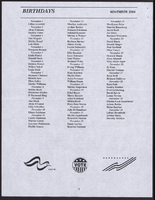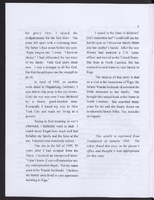Search the Special Collections and Archives Portal
Search Results

Transcript of interview with Ron Lawrence by Dennis McBride, June, July and August 1997
Date
Archival Collection
Description
Ron Lawrence is one of the busiest people in the gay community, so I want him to know how much I appreciate his reserving time for me so that I could complete this oral history interview. The importance of his work toward the well-being of the gay community in Las Vegas cannot be measured, and much of what he's accomplished and otherwise made possible will live long after he leaves us. With Ron's consent to this interview, our knowledge of Nevada's gay history is greatly enriched and our record preserved.
Text
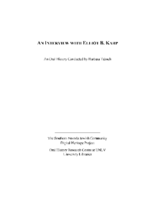
Transcript of interview with Elliot B. Karp by Barbara Tabach, December 17, 2014
Date
Archival Collection
Description
Interview with Elliot B. Karp by Barbara Tabach on December 17, 2014. In this interview, Elliot Karp discusses growing up in a culturally Jewish household in New York and becoming more observant in his teenage and college years. He decided, after a trip to Israel and a year in a rabbinical program, that he wanted to be a "Jewish professional" with a focus on social work and community organizing, and attended a Master's program at Brandeis University. Karp goes on to talk about his work for the Jewish Federation in Ohio and Pennsylvania, and being recruited to come to Las Vegas. He talks about the challenges in the Las Vegas Jewish community and the Jewish Federation's role as an umbrella organization to partner with other agencies to grow and sustain a robust Jewish community in Southern Nevada.
On October 6, 1955, Elliot Karp was born in Mineola, New York to parents of East European heritage who identified as culturally Jewish. As a teenager, Elliot felt the calling to become kosher, balancing this practice with household norms that were not as strict. He eventually became shomer Shabbat just after enrolling at State University of New York at Stony Brook, where he majored in Political Science. After graduating from SUNY, Elliot spent a year living in Israel considering a path in rabbinical studies. By the end of his time, he decided on a different, yet related path, and registered as a graduate student in Brandeis University's School of Jewish Communal Service, on fellowship from Council of Jewish Federations. After graduating, Elliot moved to Columbus, Ohio to work for the Jewish Federation, focusing on fundraising, but was exposed to many different operational areas of the organization. After three years, Elliot was recruited to the Philadelphia office as its director of leadership development. He then left the Federation to work in development at Brandeis University, but after two years, returned to the Federation as the Cincinnati office's chief development officer. In 2008, Elliot received a call to take his highly cultivated leadership and fundraising skills to another Federation office: Las Vegas. After much consideration, he took the job - and challenge - as the office's new chief executive officer. Since then, Elliot has done much to promote communication, coordination and collaboration within the local Jewish community and beyond, through relationship building and successful fundraising efforts. His ultimate desire is to expand funding for programs that get more people involved in Jewish life - while also empowering community members define what a Jewish life means for them.
Text

Transcript of interview with Stella Butterfield by Joanne Goodwin, October 14 & October 25, 2005
Date
Archival Collection
Description
Interviewed by Joanne L. Goodwin. Stella Butterfield's family, the Goldbergs, was Jewish, and she was born in the Bronx. During World War II she worked for the Coast Guard in the steno pool in Washington, D.C. Stella moved to Santa Monica a few years later while the war was still going on and worked briefly as a riveter for Douglas Aircraft and then as a teletype operator for the Air Force but at Douglas Aircraft. Because she had a hard time getting a job because of antisemitism, she changed her name to Gilbert. In December of 1948 she went to the Canal Zone in Panama to be the secretary of the commanding officer of the Panama Supply Depot. Stella was also a law reporter for court martials. She met Frank Butterfield, who was stationed there, and married him in 1952. He was transferred back to the United States, and they lived in Massachusetts. Then they moved to Los Angeles, and in 1953 they moved to Las Vegas, where she was a court reporter at Nellis Air Force Base. Then they moved to Mexico City, then back to California where she worked as a legal secretary. In early 1955 they moved back to Las Vegas, and Stella worked as a federal court reporter for Judge Roger T. Foley.
Text

Transcript of interview with Melanie Greenberg by Barbara Tabach, June 14, 2016
Date
Archival Collection
Description
When Melanie Greenberg was a young girl in her hometown of Kansas City, Missouri, she thinks it is likely that she crossed paths with her future husband at Hebrew School. However, it would be years later in college when they officially met – and fell in love and married in 1970. By 1976, Missouri was in the rearview mirror and career opportunities for her husband Gene Greenberg would lead them to Las Vegas. With their 18-month-old daughter Sari, they drove into Las Vegas for the first time, down Boulder Highway to Flamingo Road. Gene’s employer had arranged for a room at the Flamingo Hotel. As she explains, there many have been a better route, but it brought them to town and they stayed, raised their family, and became fixtures in the community since that moment. Among their first goals was finding a synagogue. Melanie’s magical touch has been felt in many places within the Las Vegas Jewish community: an active member of Temple Beth Sholom, the Jewish Federation’s Young Leadership and Women’s programs, organizer of Hebrew High, coordinator of L’Dor V’Dor activities for seniors, and Executive Director of Hillel from 1996 – 2003.
Text


